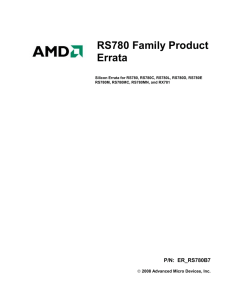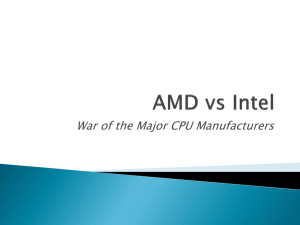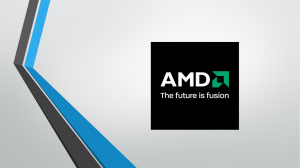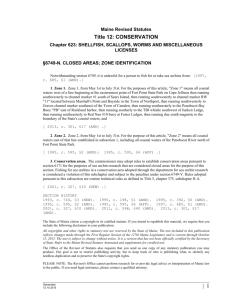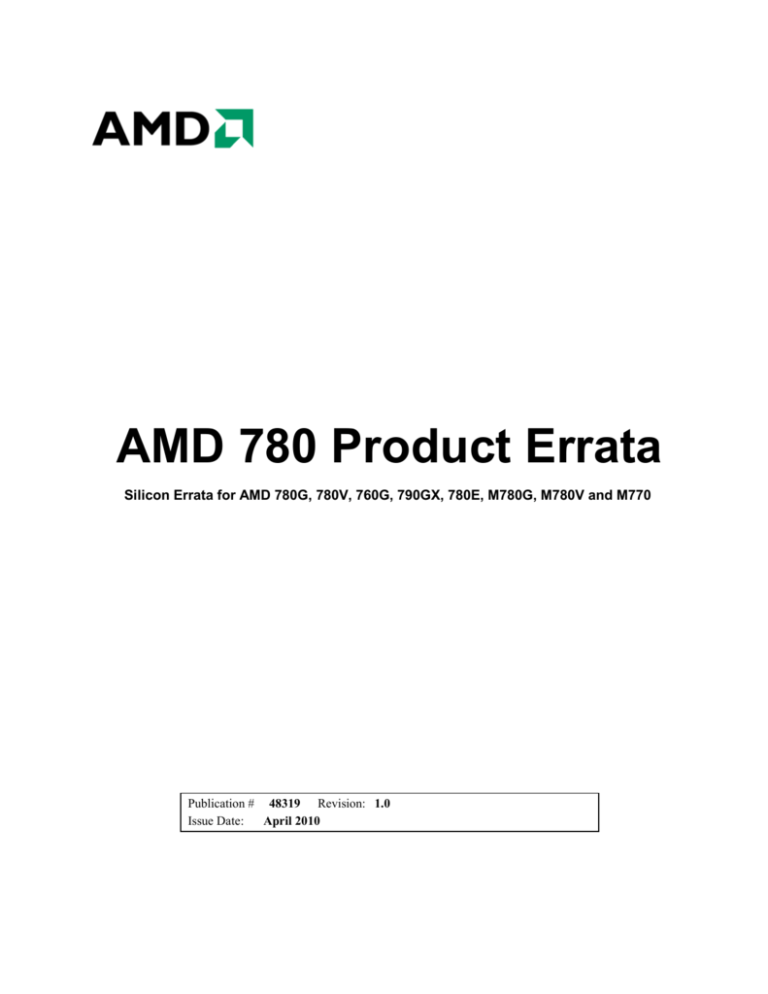
AMD 780 Product Errata
Silicon Errata for AMD 780G, 780V, 760G, 790GX, 780E, M780G, M780V and M770
Publication # 48319 Revision: 1.0
Issue Date:
April 2010
© 2010 Advanced Micro Devices, Inc. All
rights reserved.
The contents of this document are provided in connection with
Advanced Micro Devices, Inc. (“AMD”) products. AMD makes no
representations or warranties with respect to the accuracy or
completeness of the contents of this publication and reserves the right to
make changes to specifications and product descriptions at any time
without notice. The information contained herein may be of a
preliminary or advance nature and is subject to change without notice.
No license, whether express, implied, arising by estoppel, or otherwise,
to any intellectual property rights are granted by this publication.
Except as set forth in AMD’s Standard Terms and Conditions of Sale,
AMD assumes no liability whatsoever, and disclaims any express or
implied warranty, relating to its products including, but not limited to,
the implied warranty of merchantability, fitness for a particular purpose,
or infringement of any intellectual property right.
AMD’s products are not designed, intended, authorized or warranted for
use as components in systems intended for surgical implant into the
body, or in other applications intended to support or sustain life, or in
any other application in which the failure of AMD’s product could
create a situation where personal injury, death, or severe property or
environmental damage may occur. AMD reserves the right to
discontinue or make changes to its products at any time without notice.
Trademarks
AMD, the AMD Arrow logo are trademarks of Advanced Micro Devices, Inc.
HyperTransport is a licensed trademark of the HyperTransport Technology Consortium.
Windows Vista is a registered trademark of Microsoft Corporation in the United States and other
jurisdictions.
PCIe is a registered trademark of PCI-SIG.
Other product names used in this publication are for identification purposes only and may be trademarks
of their respective companies.
2010 Advanced Micro Devices, Inc.
Page 2
780 Family Product Errata
Revision History
Date
Revision
April 2010
1.0
2010 Advanced Micro Devices, Inc.
Description
• Initial public release based on OEM version ER_RS780B7
Page 3
780 Family Product Errata
Product Errata Summary
Except where otherwise noted, this product errata is applicable to AMD 780 family of Northbridge devices
including the AMD 780G, 780V, 760G, 790GX, 780E, M780G, M780V and M770.
Table 1 cross-references the revisions of the part to each erratum. An “X” indicates that the erratum applies
to the revision. The absence of an “X” indicates that the erratum does not apply to the revision. An “*”
indicates advance information that the erratum has been fixed but not yet verified. “No fix planned” indicates
that no fix is planned for current or future revisions of the ASIC.
Note: There may be missing errata numbers. Errata that have been resolved from early revisions of the ASIC
have been deleted.
Table 1:
Cross-Reference of Product Revision to Errata
ASIC Revision
#
Errata Description
A12
3
HyperTransport™ Gen3 Instability at 1.2GHz
X
17
Native PCIe Hot Plug and Native PME Wake-up Interrupt Delivery
X
18
APC Bridge Subsystem Vendor ID Decode Conflict
19
Software-initiated Interrupt Support
X
20
External PCIe® Graphics Hang with L1 Enabled
X
21
Memory Controller FIFO Overflow at Reduced Engine Speeds
X
22
Dropped Host Read
X
2010 Advanced Micro Devices, Inc.
Page 4
A13
No Fix Planned
780 Family Product Errata
Product Errata
3
HyperTransport™ Gen3 Low Speed Instability
Description
HyperTransport™ Gen3 instability has been observed when running the HyperTransport link at speeds
between 1.2 GHz and 1.6 GHz. This problem, which only affects some ASICs, has been identified as an
issue with the receiver DLL in the HyperTransport PHY when running in this frequency range.
Potential Effect on System
For an ASIC that does exhibit this sensitivity, the system will show a high retry count on the HyperTransport
link which may result in system failures, including system hangs (black screen), screen corruption, or a frozen
screen.
Suggested Workaround
For all configurations, HyperTransport Gen3 speeds should be limited to running between 1.8 GHz and
2.2 GHz.
Fix Planned
Resolved in A13 silicon
2010 Advanced Micro Devices, Inc.
Page 5
780 Family Product Errata
17
Native PCIe Hot Plug and Native PME Wake-up Interrupt Delivery
Description
A logic issue has been identified in the Northbridge that prevents internally generated MSI (Message Signal
Interrupts) and external PME (Power Management Event) messages from propagating to the CPU.
Potential Effect on System
This issue only affects PCIe native features in which control of PME and hot plug is turned over to the
operating system instead of to the BIOS firmware. For example, Windows Vista® native mode PME and
native mode hot plug features will be affected. Wake-up using PME is still supported via normal ACPI
methods (non-native PCIe mode) which continues to be fully supported by the RS780 and SB700. ACPIbased hot plug, for example, for ExpressCards continues to be supported via normal ACPI methods (General
Purpose Event triggered SCI and BIOS ASL code event handler).
Suggested Workaround
For Windows Vista, platforms should implement legacy hot plug and legacy PME features as per normal ACPI
methods. From a hardware perspective, this includes the implementation of the sideband connections
(CPPE# and WAKE#) from the ExpressCard interface to the south bridge GEVENT pins.
Fix Planned
Resolved in A13 silicon.
2010 Advanced Micro Devices, Inc.
Page 6
780 Family Product Errata
18
APC Bridge Subsystem Vendor ID Decode Conflict
Description
Overwriting the sub-system vendor ID (offset 0xB4) in the APC configuration space will result in the vendor ID
(offset 0x0) being erroneously overwritten in the APC configuration space.
Potential Effect on System
If the register is overwritten, any utilities that references the APC configuration space will report back the
updated vendor ID (OEM data instead of AMD data).
Suggested Workaround
Do not overwrite the SSID/SVID values in the APC configuration space. If required, OEM-specific SSID/SVID
data should be programmed in the internal graphics PCI configuration space (bus1, dev5, func0).
Fix Planned
None
2010 Advanced Micro Devices, Inc.
Page 7
780 Family Product Errata
19
Software-Initiated Interrupt Support
Description
Software-initiated (display driver and Video BIOS) interrupts do not function on A12 silicon.
Potential Effect on System
Features that would typically employ the use of software-triggered interrupts cannot be implemented using
software-triggered interrupts. These features include:
•
Display switch requests (e.g., display hotkey switch support)
•
Expansion mode change requests (e.g., center/expansion hotkey switch support)
•
Forced power state change requests
•
System power source change requests
•
Display configuration change request (e.g., display mapping change due to docking/ undocking)
Suggested Workaround
A display driver polling scheme (which is enabled via a driver packaging option) is available as a workaround
to this issue. Apart from the change to the driver packaging options, this workaround is transparent to the
OEM/ODM implementation. All of the existing functionality that relies on the software interrupt will continue to
function through the use of the polling method.
Fix Planned
Resolved in A13 silicon
2010 Advanced Micro Devices, Inc.
Page 8
780 Family Product Errata
20
External PCIe Graphics Hang with L1 Enabled
Description
When a PCIe® graphics endpoint device issues a PM_REQ (request entry to L1) and the root complex (i.e.,
Northbridge) issues a TLP (data packet) prior to issuing a PM_REQ (ack entry to L1), the endpoint will enter
L1 without acknowledging the TLP. Under this condition, the Northbridge will issue replays and eventually
hang because it has not received an ACK to its TLP.
Potential Effect on System
Although ATI/AMD PCIe graphics boards are not subject to this problem, non-AMD graphics boards have
been observed to hang when L1 is enabled. Please note, however, that the non-AMD graphics boards that
were tested did not support L1 and this issue was only observed after overriding the setting for the L1
capability in the configuration space of the add-in board. As such, there is no end-user impact as a result of
this issue until which time non-AMD PCIe graphics card vendors may enable L1 support.
Suggested Workaround
Disable L1 for the PCIe graphics link in the SBIOS upon detecting A12 silicon in combination with a nonAMD/ATI PCIe graphics vendor ID.
Fix Planned
Resolved in A13 silicon
2010 Advanced Micro Devices, Inc.
Page 9
780 Family Product Errata
21
Memory Controller FIFO Overflow at Reduced Engine Speeds
Description
An issue has been identified that results in an overflow of an internal memory controller FIFO when a specific
traffic pattern is exercised. This pattern consists of a non-write-combined transaction followed by a writecombined transaction. The problem is only exposed when write-combining is enabled in conjunction with the
PowerShift engine clock frequency scaling feature.
Potential Effect on System
This issue may cause system hangs and/or general system instability on platforms supporting a sideport
memory interface.
Suggested Workaround
Exposure to this failure is eliminated by adjusting the PowerPlay table in the VBIOS such that the minimum
PowerShift engine frequency is set to 300 MHz.
Fix Planned
Resolved in A13 silicon
2010 Advanced Micro Devices, Inc.
Page 10
780 Family Product Errata
22
Dropped Host Read
Description
A host read may get dropped by the Northbridge if it was preceded by a non-posted host memory write under
certain highly specific traffic and timing conditions. When the Northbridge IO controller’s (IOC) host request
buffer is full, an incoming non-posted host memory write will be internally completed and a response will be
returned to the processor prior to the IOC actually executing and completing the write which is then queued in
a buffer in front of the IOC. In this state, a subsequent host read request received from the processor will try
to claim the buffer location that is filled with the pending non-posted write resulting in the read getting
dropped. Any forward progress by the IOC’s host request buffer during the time between the non-posted write
and the read will bring the device out of the previously described state and allow for correct execution.
Potential Effect on System
This issue may cause system hangs and/or general system instability during system stress testing.
Suggested Workaround
A system BIOS workaround is used to set all transactions as non-posted and removes all Southbridge
devices from the CPU MMIO map. This workaround was originally introduced in RS780 CIM-X version 2.0.2.
It has been recently updated in CIM-X version 4.1.0 to account for compatibility issues involving a limited
number of non-HD PCI audio hardware. Testing and qualification has confirmed that there is no performance
impact as a result of this workaround.
Fix Planned
Resolved in A13 silicon
2010 Advanced Micro Devices, Inc.
Page 11
780 Family Product Errata

